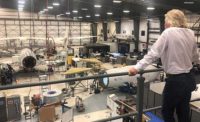Local for Local Pays Off for U.S. Automotive Assembly

Growing sustainability and resilience concerns brought about by trade war uncertainty and the COVID-19 pandemic have companies looking for ways to mitigate risk and increase agility. To respond to the disruption, manufacturers are considering more resilient, localized supply chains. Reshoring shortens supply chains, shrinks response time, and reduces our overreliance on imports, while maintaining or improving profitability.
The automotive industry, in particular, is reaping the benefits of a local for local business model.
For example, electric vehicle (EV) maker Tesla Inc. recently selected the Austin, TX, area for its second U.S. assembly plant. The new factory will build the upcoming Cybertruck pickup and the Model Y small SUV. Representing a $1.1 billion investment, the facility will employ at least 5,000 workers with a minimum wage of $15 per hour and benefits that include health insurance and paid leave.
“[The factory] is going to be stunning… It’s going to basically be an ecological paradise,” predicts Tesla CEO Elon Musk.
Proximity to eastern U.S. markets, $60 million in tax breaks, ecosystem synergies and infrastructure made the 2,100-acre site an attractive location for the plant.
As more automotive OEMs set up shop in the U.S., clusters of suppliers invariably follow to be close to them, bringing more jobs. Shorter supply chains improve companies’ environmental impact. Even though EVs are better for the environment, they still have a substantial carbon footprint. Keeping the supply chain local reduces that footprint. For example, 69 percent of light-duty plug-in EVs on the road in the U.S. were assembled in the U.S. As startups like Rivian and established OEMs like Ford begin producing EVs, the share of domestically assembled vehicles is expected to increase.
One EV startup that will contribute to that share is Lordstown Motors. In 2019, the company purchased GM’s old assembly plant in Lordstown, OH, with plans to mass-produce its battery-powered Endurance pickup truck. Initially the plant will employ 400 assembly workers, 100 motor line workers, 100 battery line workers and 300 engineers. But, “the company has ambitious plans to eventually hire thousands of people back to the plant,” says CEO Steve Burns.
The Lordstown area, dubbed “Voltage Valley,” is an ecosystem of EV-connected industries. GM and South Korean partner LG Chem are investing $2.3 billion in a battery cell assembly plant near the Lordstown factory. The 50-50 venture will manufacture battery cells to power future GM EVs, creating more than 1,100 jobs.
Northeastern Georgia is also becoming an automotive cluster. For example, German auto parts manufacturer GEDIA Automotive Group is investing $85 million to build a new assembly plant in Dalton, GA, creating 200 jobs. The facility will produce parts for electric vehicles.
GEDIA chose Dalton because of its proximity to multiple automotive OEMs. The new plant will be within 250 miles of nine OEMs, including Volkswagen, BMW, Kia, Mercedes-Benz and Toyota. “Moving closer to the original equipment manufacturers allows us to serve the American market even better,” says Markus Schaumburg, CEO of GEDIA Automotive Group.
See if you, too, can profitably manufacture or source domestically. Start with the offshored product that causes you the most pain due to issues with quality, delivery, inventory, intellectual property risk, stock-outs or travel. Then, do your own TCO analysis. It’s easy, and we are available to help. The free online Total Cost of Ownership Estimator will more accurately determine the real profit and loss impact of reshoring or offshoring. The Reshoring Initiative provides tools for companies to decide whether their overhead comes down more than their manufacturing cost goes up when sourcing locally. Using TCO will assist your company to more accurately assess the total microeconomic impact of your offshoring or reshoring decisions.
Looking for a reprint of this article?
From high-res PDFs to custom plaques, order your copy today!





